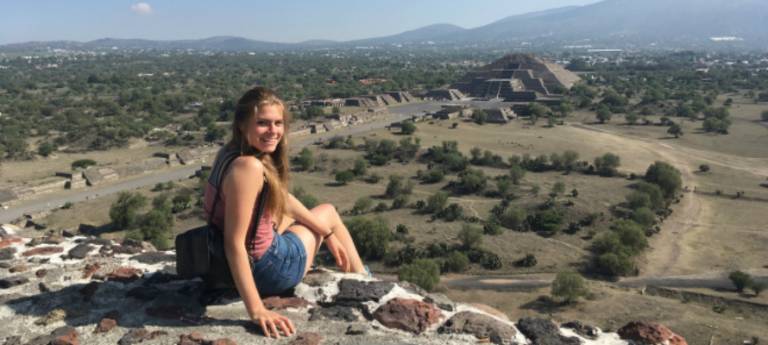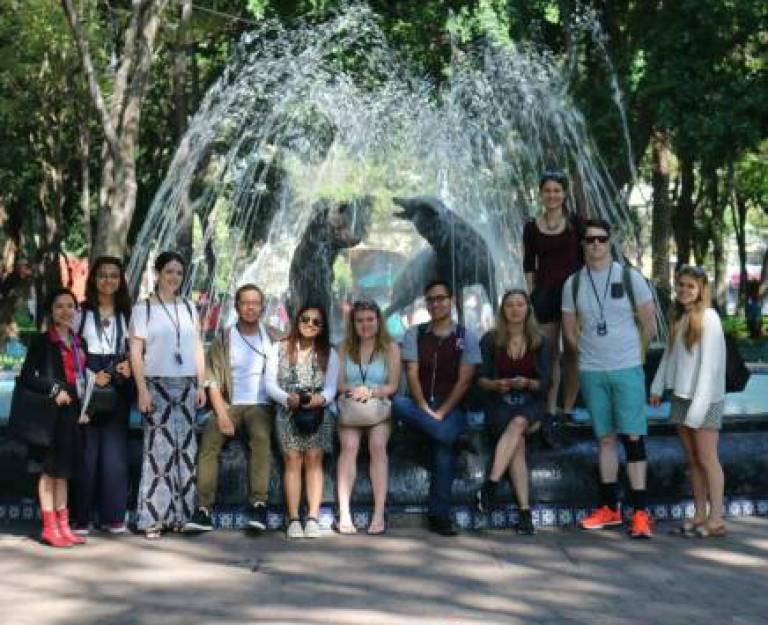El Colegio de México
14 March 2019
Jennifer Dickson spent five weeks in Mexico City on the International Summer Programe at El Colegio de México.

Jennifer Dickson, Arts and Sciences (BASc)
This trip was a very last minute decision but the opportunity came up late and it seemed too good to refuse.
Exam season was stressing me out (who doesn’t it?) and even more so because I had made no plans for my summer and none of my friends had the time to do any planning…all I knew was that in August I was to embark on my year abroad in Quito, Ecuador.
When I received an email with details of a Latin America and Mexico study program in Mexico City I jumped at the chance to go and to have a feel of Latin America before I establish myself there for an extended period of time.
In just over a month after I applied I journeyed alone to the big urban sprawling capital of Mexico.
It wasn’t just the prospect of living in a new city and experiencing Latin America for the first time that really drew me to apply for the program. El Colegio de México, the institution that has started the international summer course, is one of the most prestigious in the region. We had a choice of about eight classes that we voted on and in the end we had four to attend in the five weeks: Mexican Foreign Policy, Critical Issues of the Mexican and Global Environmental Agenda, An Overview of Mexican History, 1517-2017 and Contemporary History of Mexico in the Context of Latin America. These classes taught by the expert professors of the university covered a range of topics that gave us an insight into aspects of the country that we were living in. It became clear how useful the information was when we escaped on Fridays on cultural trips as the information we learned helped us to understand what we saw. The fundamental history of the country we learned was important throughout our time there with every experience.
As I just mentioned, we went on cultural trips around the city every week (all paid for by the program!). These covered most of the main areas to see which was important because we did spend most of our hours Monday to Thursday in classes at the university. After class we did try to get into the centre for dinner, a few drinks (had to live life like the locals and sip mezcal or tequila) or for a show (like the Ballet Folklórico de México) but travel around Mexico City is so difficult, especially at the peak hours we were moving at. On average I would say one trip to somewhere would take an hour to an hour and a half!
So, we did make the most of our weekends. We were lucky enough to have an international driver in our group who volunteered to take us on road trips to towns outside of the city. We visited Puebla as well as Teotihuacan and El Tajin. Alternatively, if you are not so fortunate with a personal chauffeur as a friend, then there are many tours and buses that will take you on these trips. On the last weekend we all paid to have a private tour and to go to las Grutas de Cacahuamilpa and then to Taxco so that our friend could have a day off driving. It also meant that we had a tour guide who explained everything in more detail than we would have been able to get our hands on ourselves. Another plus was that the guide had friends that owned silver shops and who gave us extra special attention and lots of free tequila!
Spending five weeks immersed in study was more intense than I had originally thought. We had two 2 hour long classes in the morning, a 2 hour lunch break, and 2 hours of a Spanish class to finish the day. It seemed a lot each day but the time really did fly by. The classes were packed with information and now, upon reflection and writing a short assessment piece at the end, I feel like I learned so much. I joined the program with very little knowledge about the country besides being able to speak the language but now I have already booked to go to Cancun to see even more! As well as sparking my interest in Mexico, the time I spent there has made me feel more comfortable living in a new country and meeting new people, even despite a slight language and cultural barrier.

 Close
Close

